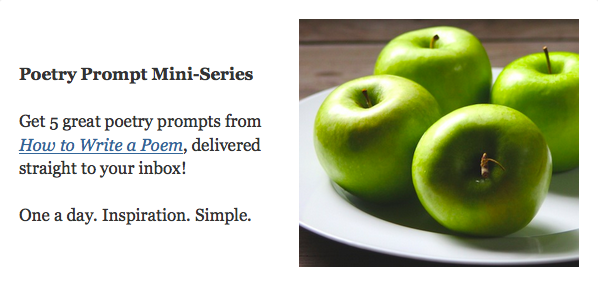
If you’ve experienced the power of a word, you’ve experienced the power of poetry.
If you’ve thrilled to discover a new connection, you’ve experienced the power of poetry.
Poetry is the power of language in concentrated form. A poem suggests more than its words say through the power of connections. A rush of meaning overspills its banks to be scooped up by a reader’s pitiful little cup. But oh, what fresh, life-giving waters can be drunk even from the sorriest of vessels.
The tools of poetry forge links: comparisons are made with similes and metaphors; patterns are established with rhythms, meters and sounds; associations are offered through rhymes, repetitions, and images. Poetry relates eye to word, sense to sound, mind to matter, mystery to manner.
Here’s one example, taken from the famous opening lines from a traditional poem by Robert Burns:
My love is like a red, red rose
That’s newly sprung in June:
My love is like the melody
That’s sweetly played in tune.
The density of the simple language and imagery in this poem, once released, reveals a treasure hoard of connections: my love can mean both my emotion and the person I love; the rose is not just any rose, but a red rose, and not just any red rose, but a red, red rose (and, oh, what a difference!); June connects this love to both the freshness of spring (as does the word sprung) and the matrimonial season; the rhyming of June and tune bring harmony to the melody that is so like this love, a song not only played in tune, but sweetly so; the fact that the meter of the entire stanza forms in itself a sweet tune, reinforces the whole sense of the passage. And there there are so many more connections that might be made—even with such simple lines.
Now here’s a stanza from a much more complex and difficult poem, T. S. Eliot’s “The Hollow Men”:
Those who have crossed
With direct eyes, to death’s other Kingdom
Remember us—if at all—not as lost
Violent souls, but only
As the hollow men
The stuffed men.
On the surface, this poem appears much more cryptic, its meanings much more “hidden.” Yet, just as in the lines from Burns’ poems, the meaning arises from the connections: connections between and among the poem’s sounds, rhythms, and rhymes as well as those connections we make from our own world of experience and knowledge—just as with the simpler poem.
Why poetry? It’s the tie that binds. Binds likeness to likeness, word to music, image to sensation. While the rest of the world divides and derides, pushes away and pushes apart, confronts and affronts, poetry brings together. While the world spots differences, poetry seeks semblances. It weaves a fractured, fallen world back together, word by word. Gathers up scattered pieces of brokenness and glues them back together again like a cracked china cup in which meaning is served to overflowing.
Photo by Gemma Stiles, Creative Commons, via Flickr. Post by Karen Swallow Prior.
___
Click to get FREE 5-Prompt Mini-Series
- Have We Outlived Epic Poetry? Maybe, But Herrera to Rowling Say No - September 25, 2015
- About Shakespeare: Poet and Playwright - August 29, 2014
- Poetry Classroom: A Valediction—Forbidding Mourning - February 27, 2013

Brittiany Godby says
Pillars
Are more powerful when scattered
Fragmented, augmented–
cookie crumbs across
A toddler’s chin.
I found her Ionic and strong.
I embraced her, my own iron doll
More delicate than the patchwork babies
Flogging wombs.
She was Corinthian
Well-adorned in all the accoutrements
A Father’s lace provides:
Skirted intricacy casting shadows
On the temple’s tides.
I lumbered in her provision
Of a place to rest my back
(stone makes scratch),
And I slept
In final acceptance. Final.
Final.
Until I awoke
To wipe away the ruins
With my spittle cloth,
Her makeshift bib
And red
That consumes the soles of sandals
Of wayward wo(men)
Running, seeking pillars,
The mentors of the clouds.
–a poem entitled “Karen”, written by B.H.Godby
Brittiany Godby says
The poem “Karen” was what I wrote in response to this stunning article. I didn’t know of a better way to express how it impacted me. When someone can respond immediately to a piece about poetry only by writing a poem, the author knows that the piece has effectively done its job.
I was stunned,
silenced
except for the words she gave me.
Well done. And, encore. Infinite encore.
Karen Swallow Prior says
Why, if my post on “Why Poetry” prompts more poetry, that is success indeed! Thank you, Brittiany, for responding in the most appropriate way!